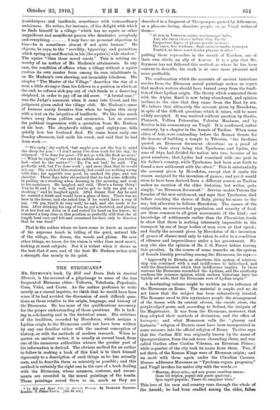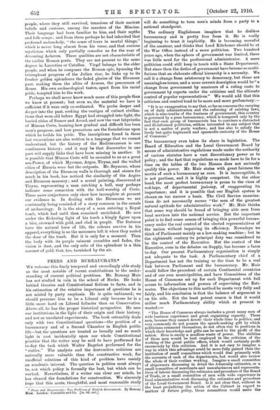THE ETRUSCANS.*
MR. SEYMOUR'S book, Up Hill and Down Dale in Ancient Etruria, is the account of a pilgrimage to some of the less frequented Etruscan cities : Volterra, Vetulonia, Populonia, Cosa, Vulci, and Caere. As the author professes to write merely as a casual inquirer, we think that he would have been wiser if he had avoided the discussion of such difficult ques- tions as those relative to the origin, language, and history of the Etruscans. He has none of the qualifications necessary for the proper understanding of these questions. He is lack- ing in scholarship and in the historical sense. His criticism of the tradition, recorded by Herodotus, which assigns a Lydian origin to the Etruscans could not have been written by any one familiar either with the ancient conception of history, or with the methods of modern research. When he quotes an ancient writer, it is usually at second hand, from one of the numerous authorities whence the greater part of his information is derived. The obvious method for an author to follow in making a book of this kind is to limit himself rigorously to a description of such things as he has actually seen, and to describe them as minutely as possible; and this method is certainly the right one in the case of a book dealing with the Etruscans, whose manners, costume, and amuse- ments are recorded in the mural paintings of the tombs. These paintings reveal them to us, much as they are • UP Hill and Down Dale in Ancient _Etruria. By Frederick Seymour. Toadon: T. Fisher Uncoil. (les. dd. not.]
described in a fragment of Theopompus quoted by Athenaeus,
as a pleasure-loving, dissolute people, or, as Virgil writes of them--- "At non in Venerem segnes nocturnaque Bella,
Aut, ubi curve choros indixit tibia lineal Exspectare dapes, et plenae pocula mensae; Hic amor, hoc stadium ; dum PAcra, secundus haruspea Nuntiet, ae locos vocet hostia pinguis in altos "-
putting these reproaches in the mouth of Tarchon, one of their own chiefs, an ally of Aeneas. It is a pity that Mr. Seymour has not followed this method, as where he has been
content to describe, his work is at once more pleasant and more profitable.
The confirmation which the accounts of ancient historians receive from the Etruscan mural paintings makes us regret that modern writers should have turned away from the tradi- tion of their Lydian origin. The thedry which connected them
with the Alpine Raeti is now being abandoned, and opinion inclines to the view that they came from the East by sea. We believe that ultimately the account given by Herodotus, in spite of the difficult questions which it raises, will be more
widely accepted. It was received without question by Strabo, Plutarch, Vellins Paterculus, Valerius Maximus, and by Servins in his commentary on Virgil. It is confirmed, rather curiously, by a chapter in the Annals of Tacitus. When some
cities of Asia were contending before the Roman Senate for the honour of building a. temple to Tiberius, " the Sardians quoted an Etruscan document (decretum) as a proof of kinship : their story being that Tyrrhenus and Lydus, the sons of Atys, had divided the nation into two, because of its great numbers ; that Lydus had remained with one part in his father's country, while Tyrrhenus had been sent forth to found a new settlement with the other." This fs substantially the account given by Herodotus, except that it omits the reason assigned for the invention of games; and yet it would
seem to have been derived from a different source, as Tacitns makes no mention of the older historian, but writes, quite simply, "an Etruscan document." Servius makes Tuscus the founder of the new settlement, and says that Tyrrhenus died before reaching the shores of Italy, giving his name to the sea ; but otherwise he follows Herodotus. The causes of the emigration, an overcrowded population and scarcity of food, are those common to all great movements of the kind ; our knowledge of settlements earlier than the Phoenician tends to show that there is nothing inherently impossible in the
transport by sea of large bodies of men, even at that epoch ; and finally the account given by Herodotus of the invention of games of chance need only be taken to refer to a condition
of idleness and improvidence under a lax government. We may cite also the opinion of Dr. J. G. Frazer before leaving this question. In the course of some remarks on the system of female kinship prevailing among the Etruscans, he says:—
" Apparently in Etruria, as elsewhere, this system of relation- ship was combined with a real indifference to fatherhood, and with the dissoluteness which that indifference implies. In these customs the Etruscans resembled the Lydians, and the similarity confirms the common opinion, which modern historians have too lightly set aside, that the Etruscans were of Lydian origin."
A fascinating volume might be written on the influence of
the Etruscans on Rome. The material is ample, and we do not know that the subject has been exhaustively treated. The Romans owed to this mysterious people the arrangement of the house with its central atrium, the curule chair, the purple-edged gown, and, according to Sallust, the insignia of the Magistrates. It was from the Etruscans, moreover, that they adopted their methods of divination, and the office of haruspez ; and what Mommsen calls the "gloomy and fantastic" religion of Etruria must have been incorporated in some measure into the official religion of Rome. Tacitus says
that the Caelian Hill was originally known by the name of Querquetulanus, from the oak-trees abounding there, and was called Caelian after Caelins Vibenna, an Etruscan Prince ; while a quarter of the city took its name from them. Two, if not three, of the Roman Kings were of Etruscan origin; and we meet with them again under the Claudian Caesars. Horace addresses Maecenas as " Tyrrhena regum progenies," and Virgil invokes his native city with the words :—
"Mantua, dives avis ; sad non genus omnibus nnum ; liens illi triplex, populi sub genie qnaterni ; Ipsa caput populis ; Tusco de sanguine vires."
This love of his race and country runs through the whole of the Aeneid ; he had been cradled among the older, fallen
people, where they still survived, tenacious of their ancient beliefs and customs, among the marshes of the Mincius. Their language had been familiar to him, and their myths and folk-songs; and from them perhaps he had inherited that profound melancholy, " the sense of tears in mortal things," which is never long absent from his verse, and that curious mysticism which only partially consoles us for the roar of devouring Acheron. These qualities are not characteristic of the earlier Roman poets. They are not present to the same degree in Lucretius or Catullus. Virgil belongs to the older people, and when he composes the Roman epic, hymning the triumphant progress of the Julian star, he links up to its fresher golden splendours the faded • glories of the Etruscan past, making them the allies of Aeneas, the precursors of Rome. His own archaeological tastes, apart from his racial pride, tempted him to the work.
Perhaps we shall never know much more of this people than we know at present; but even so, the material we have is sufficient if it were only co-ordinated. We probe deeper and deeper into the past, seeking the vestiges of extinct civilisa- tions that were old before Egypt had struggled into light, the buried cities of Sumer and Accord, and now the vast labyrinths of Minoan Crete, learning how gradual and difficult has been man's progress, and how precarious are the foundations upon which he builds his pride. The inscriptions found in these last excavations are also written in a language that we cannot understand, but the history of the Mediterranean is one continuous history ; and it may be that discoveries in one part will supply links that have been missing in another. It is possible that Minoan Crete will be revealed to us as a great sea-Power, of which Mycenae, Argos, Tiryns, and the walled cities of Etruria were but the outposts. Mr. Seymour, whose description of the Etruscan walls is thorough and atones for much in his book, has noticed the similarity of the Argive and Etruscan masonry ; and a mural painting, discovered at Tiryns, representing a man catching a bull, may perhaps indicate some connexion with the bull-worship of Crete. These mere conjectures only show how incomplete at present our evidence is. In dealing with the Etruscans we are continually being reminded of a story common in the annals of archaeology. It is the story of a man entering a Royal tomb, which had until then remained unviolated. He sees under the flickering light of his torch a kingly figure upon a bier, crowned with gold, and clad in purple. The features have the natural hues of life, the colours survive in his apparel, everything is as the mourners left it when they sealed the door of the tomb. But it is only for a moment. Then the body with its purple raiment crumbles and fades, the vision is dust, and the only relic of the splendour is a thin coronet of gold, that, too, tarnished by the air.















































 Previous page
Previous page